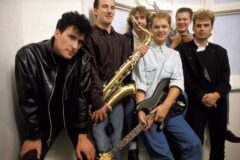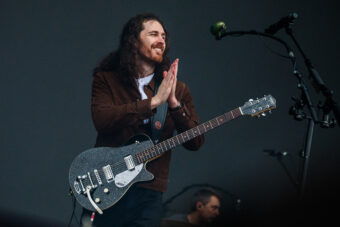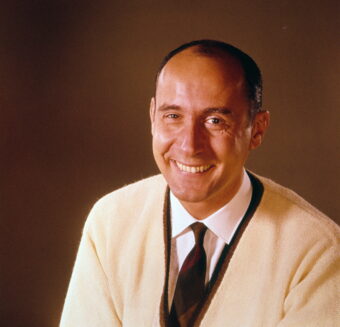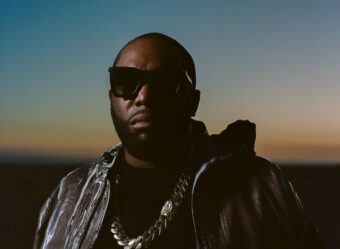35 years ago, Orchestral Manoeuvres in the Dark started as an attempt to capture the future. At the respective ages of 16 and 15, Andy McCluskey and Paul Humphreys started wrangling synthesizers in the back room of Humphrey’s mother’s house in Northwest England, creating a sumptuously mechanized take on the post-punk that ruled the late ’70s British music scene. Their fractured, analog sample-heavy weirdness was the undercurrent that carried through even to their biggest pop breakthrough Stateside: the appearance of their yearning “If You Leave” on the soundtrack to John Hughes’ Pretty In Pink.
Though the intervening years have seen McCluskey and Humphreys take on a number of musical endeavors of varying success (including McCluskey’s stint as the main songwriter for the British girl group Atomic Kitten), the duo’s 2006 reunion spawned further grasps at the future, both on 2010’s History of Modern and the new English Electric (BMG), which features contributions from fellow forward-thinker Karl Bartos of Kraftwerk.
McCluskey, now 53, spoke with us on the phone and told us what he’d learned in his long career as a synth-pop experimentalist.
You have to do it your own way.
We had to learn to stick to our own interests, our own concepts, our own parameters — to never let the cart get in front of the horse. We just started writing music because we felt a need to write music. It was never intended to be a career. OMD started for one gig as a dare. The reason we were a two-piece and a tape recorder was because nobody wanted to hear the songs! We played the gig and then amazingly got offered a second and the people that offered the second gig started [Factory Records]. The first person that said, “You guys make the future of pop music” was Tony Wilson from Factory Records. And you know what we replied? “Fuck off! We’re not pop, we’re experimental. Don’t call us pop.” He turned out to be right. We became popular and sold millions of records. We did it on our own terms. Nobody told us what to do.
You need good lawyers and accountants before you even start in the music industry.
We just signed the first piece of paper that came in front of us. We were on a six percent royalty. So if the retail price was a pound, we’d make six pence. Most of our sales were international and we were on two-thirds royalties [overseas]. Then the producer got three points. So we got one penny. Out of that penny we’d have to pay our recording costs and the video budget. When I was 22 years old, I had three albums out. We’d sold 4,000,000 records and over 15,000,000 singles and I was still living in a six-foot-by-seven-foot room in my parents’ house. I had all these gold and platinum albums and I thought, “There’s something wrong here.” We were touring for six months straight and then coming back broke. For all the millions of records we sold we made peanuts.
More is not always better.
Just because you have 200 studio tracks doesn’t mean you should use them. The early songs were very, very simple. If you got to 24 tracks and someone said, “I’ve got an idea,” you went, “Yeah, okay, is that idea better than the other 24 things we’ve recorded? Because we’re going to have to erase something to record that idea.” By default you had to edit as you went. Now, I’ve had to be a ruthless self-editor instead of just relying on the fact that I’ve only got so many channels. Now you have too many channels and you have to decide what you’re going to do. I made an album in 1993 called Liberator. I programmed it all myself. Then I worked with a producer who reprogrammed it. I wanted to keep my programming and he wanted to keep his programming, so every song had two sets. Boy, was it busy. Way too busy. That’s something that unfortunately I didn’t really get my head around at the time.
Musicians are the enemy of good songwriting.
I hate musicians, I’m so glad I’m not one. I’m a songwriter and I sing a bit. I do not ever want to be considered a musician. Being a musician is just a means to an end. For every great song that is written there’s 100,000 musicians that can actually play it. Unfortunately musicians spend years torturing their bodies to get around pieces of wood and metal and string. You spend all this time learning to be a musician. So what do they want to do? They want to bore the pants off of you showing you how great a musician they are. Guitarists are the worst offenders. You look at some songs and you think, “I don’t give a shit how many notes you can play, play a fucking tune I can remember.”
We live in a world of cut-and-paste journalism.
Can I tell you something about [OMD’s 1983 album] Dazzle Ships? When Dazzle Ships was re-released and remastered 25 years later, I had learned a sufficient amount about the music industry that I decided, “Okay, you tell people what to think.” So I wrote the press release and I wrote in the press release, “This album that almost destroyed their career is now considered their fractured masterpiece, their broken genius.” I rewrote our own history and everybody bought it.
Now, if people deem your work to be iconic, then you’re re-evaluated.
In the ’90s came the postmodern era and it was very strange for us. For example, a song we wrote when we were 16 called “Electricity,” which was trying to be The Future, was deemed The Past — 20 years later. I can deal with that because if we are always moving forward then older things are going to be considered out of date. However, in the postmodern era, bands came along and said, “Yes, what you did in the ’80s is out of date, but ‘The Future’ sounds like 1969.” We were like “What the hell?” Everything, art, film, music, architecture, became self-referential. There’s no “in fashion” or “out of fashion.” There are bands the same age as our oldest kids referencing us as influences. Somehow, it seems we have a body of work that is quite influential.





